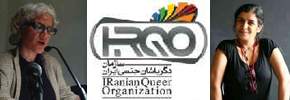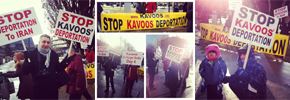Sima Sahar Zerehi – “I had reached a page more detailed, and more narrative, than any previous section, and I slowed down to focus. It was the transcript of a conversation between a government minister and a member of the death squad. When my eyes fell on that sentence that would haunt me for years to come, I thought I had misread, I blinked once, but it stared back at me from the page: ‘The next person to be killed is Shirin Ebadi.’ Me.”
Laurie H. Pawlitza, Treasurer of the Law Society of Upper Canada begins her introduction of Nobel Peace Price recipient; human rights lawyer, activist, former judge and author, Dr. Shirin Ebadi by reading an excerpt from her book, Iran Awakening.
The passage recounts how in the fall of 2000, while representing the family of two of the victims of the chain murders that took place in the late nineties in Iran, Ebadi came upon a transcript of a conversation between her would be assassin and the Minister of Intelligence requesting permission to carry out her killing.
The hall is filled with an audience of smartly dressed lawyers, breathlessly awaiting Ebadi’s remarks. The event is a tribute to Dr. Shirin Ebadi organized by the Law Society of Upper Canada. This crowd of starry-eyed lawyers includes a few more ethnic faces and women than usual, with a large showing from the Iranian Legal Professionals of Ontario.
Dr. Shirin Ebadi is a household name to most Iranians, she is a lawyer, a former judge and human rights activist and founder of the Defenders of Human Rights Center in Iran. On October 10, 2003, she was awarded the Nobel Peace Prize for her groundbreaking efforts towards democracy and human rights, particularly her work on women’s, children’s, and refugee rights. Dr. Ebadi was the first Iranian to receive this prize.
Dr. Ebadi was the first ever female judge in pre-revolutionary Iran taking a seat on the bench in 1975, after the 1979 revolution, she was removed from the bench as women were forbidden to serve in this position and asked to act as a clerk in the same court where she used to preside. Finding the new working conditions intolerable, Ebadi left the bench to pursue a career in writing and later returned to practice law as a human rights lawyer with her own practice.
As a lawyer, Ebadi made a name for herself representing a number of high profile cases including the case of Ezzat Ebrahiminejad, a student killed during the attack by security forces on Tehran University’s dormitory that preceded and provoked the July 1999 student riots in Iran. She also represented the mother of Mrs. Zahra Kazemi, an Iranian-Canadian photojournalist killed in Iran.
Ebadi has worked on a significant number of cases dealing with children’s rights and women’s rights as well, advancing the plight of these marginalized populations.
Like many other larger-than-life public figures, Ebadi seems much smaller in person. Looking at her sitting patiently on the side of the stage in her modest grey pantsuit, it’s hard to equate her with the person listed in 2004 by Forbes magazine as one of the “100 most powerful women in the world.”
But Ebadi’s influence is palpable in the way she’s revered by her colleagues in the legal profession.
“If you ask what the law means to Shirin Ebadi,” continues Pawlitza, “she’ll tell you she chose law to serve justice.”
Once Ebadi takes to the podium, the charisma and conviction that make her an international force, and one of the key voices representing Iran, emerges.
Ebadi is not one to waste words on trivialities, she gets right to the point: “Although it appears that we live in a globalized world, it feels like only commerce has been globalized. We have to try to globalize justice as well,” she states.
Ebadi’s talk is a set of marching orders to young lawyers hoping to follow in her footsteps; she encourages them to pursue justice by focusing on the creation of new legislation.
She cautions, “Human rights in a global concept and no country has the right to violate it on the basis of cultural relativity.”
Ebadi takes this opportunity to familiarize the audience of Canadian legal professionals with the state of human rights in Iran.
“The Iranian government takes part in all the international human rights conventions and has the obligation to follow them, however it continuously and repeatedly violates human rights, to the extent that in 2010 the human rights council had to assign a special rapporteur for the human rights case of Iran,” explains Ebadi.
Quoting statistics from Reporters Without Borders, Ebadi cites how Iran has the most number of journalists and writers in prison. She explains that for three consecutive years Iran was recognized as the enemy of the internet by journalists.
Ebadi also points out that globally Iran is only second to China in carrying out the most number of executions in the world. She notes that when this statistics is weighed against the two nations’ populations, Iran bears the most executions per capita.
Speaking directly to the lawyers and judges in the audience, Ebadi recounts, “After the 1979 revolution in Iran laws were passed that are in total violation of human rights.”
Ebadi states how draconian, “sentences such as stoning, crucifixion, cutting the hands of thieves, and flogging were included in our penal system.”
Ebadi takes the time to illustrate how particular populations are persecuted through the legal system in Iran.
She notes, “Homosexuality bears a death sentence in Iran.”
“A Muslim who converts to another religion is also sentenced to death, currently Mr. Yousef Nadarkhani has received the sentence of execution and is waiting for the execution sentence to be carried out,” states Ebadi.
Taking particular care to speak at length about gender persecution in Iran, Ebadi provides a number of examples: “Pursuant to the law in court, the testimony of two women is equal to the testimony of a single man,” offers Ebadi.
Speaking about the state of family law in Iran she adds, “A man can marry four wives and can divorce his wives as he pleases, however, divorce for a woman is very difficult.”
Addressing the hypocrisy of these chauvinistic laws in a country where women are active participants in all aspects of society, Ebadi points out, “These laws are enforced in a country where over 65% of the university students are female, many of our university professors are women, and women are present in all social careers.”
Ebadi also takes care to address the treatment of religious minorities in Iran.
She explains “The Baha’i in Iran are deprived of all civil rights. From the beginning of the 1979 revolution they were barred from enrolling in universities and there are a number of people who are in prison for merely their belief in this religion.”
Ebadi also takes the time to speak about censorship in Iran. “Censorship is prevalent in Iran and there are many laws that support it,” she begins. “Pursuant to the law governing the media, criticism of the constitution is prohibited and will result in the closure of the publication.”
Speaking about the international response to Iran’s human rights violations, she recounts, “The European Union generated a list of 100 Iranian that had violated human rights, and barred them from entering any EU country and froze any of their assets held in the EU.”
Ebadi notes that Norway has also echoed this tactic.
She explains that the United States also took measures to register their objections of human rights violations in Iran. She explains, “although the list that the US has prepared was not that important because there was no political relationship between Iran and the US since the beginning of the revolution, either way, in order to show their respect for human rights, the United States also generated a list.”
Turning her attention to Canada, Ebadi delivers a sharp indictment of our government’s failure to take decisive action in support of human rights in Iran. Raising her voice to stress this point, she declares, “Unfortunately, the government of Canada has not accepted this list or prepared such a list, despite the fact that it has taken the initiative to present a few of the resolutions against Iran.”
“Those corrupt individuals who commit human rights violations in Iran transfer their money to Europe or Canada to invest. It has been over a year since Europe has froze their assets, barred them from entering Europe and refused to accept their dirty money. However, unfortunately, Canada has become a sanctuary for those who commit torture in Iran and come to this country with their dirty money to invest,” declares Ebadi.
“In this very city, in Toronto, there are over 20 people who have been involved with violations of human rights in Iran and have come with dirty money and have unfortunately been able to become citizens in this country,” states Ebadi.
“On behalf of the people of Iran, I urge the jurists in this audience to bring this matter to the attention of the Canadian government, and to prohibit those who violate human rights and who commit crimes from entering this country and make the world smaller for perpetrators of such crimes,” urges Ebadi.
Ebadi concludes with, “Lets make justice global and make the world smaller for dictators.”
————————————–
At this event Dr. Ebadi was recognized by John Gerretsen who presented an official statement on behalf of the Ontario Ministry of the Attorney General congratulating her on receiving the Honorary Doctor of Laws degree from the Law Society of Upper Canada. This dedication was initiated by Dr. Reza Moridi, the MPP for Richmond Hill.
While this event was spearheaded by the Law Society of Upper Canada, The Iranian Legal Professionals of Ontario took a leading role in bringing many members of the Iranian legal community to the talk.







Hatman! Wishful thinking. She is 60 percent islamized. Beeeeeee khasiat!